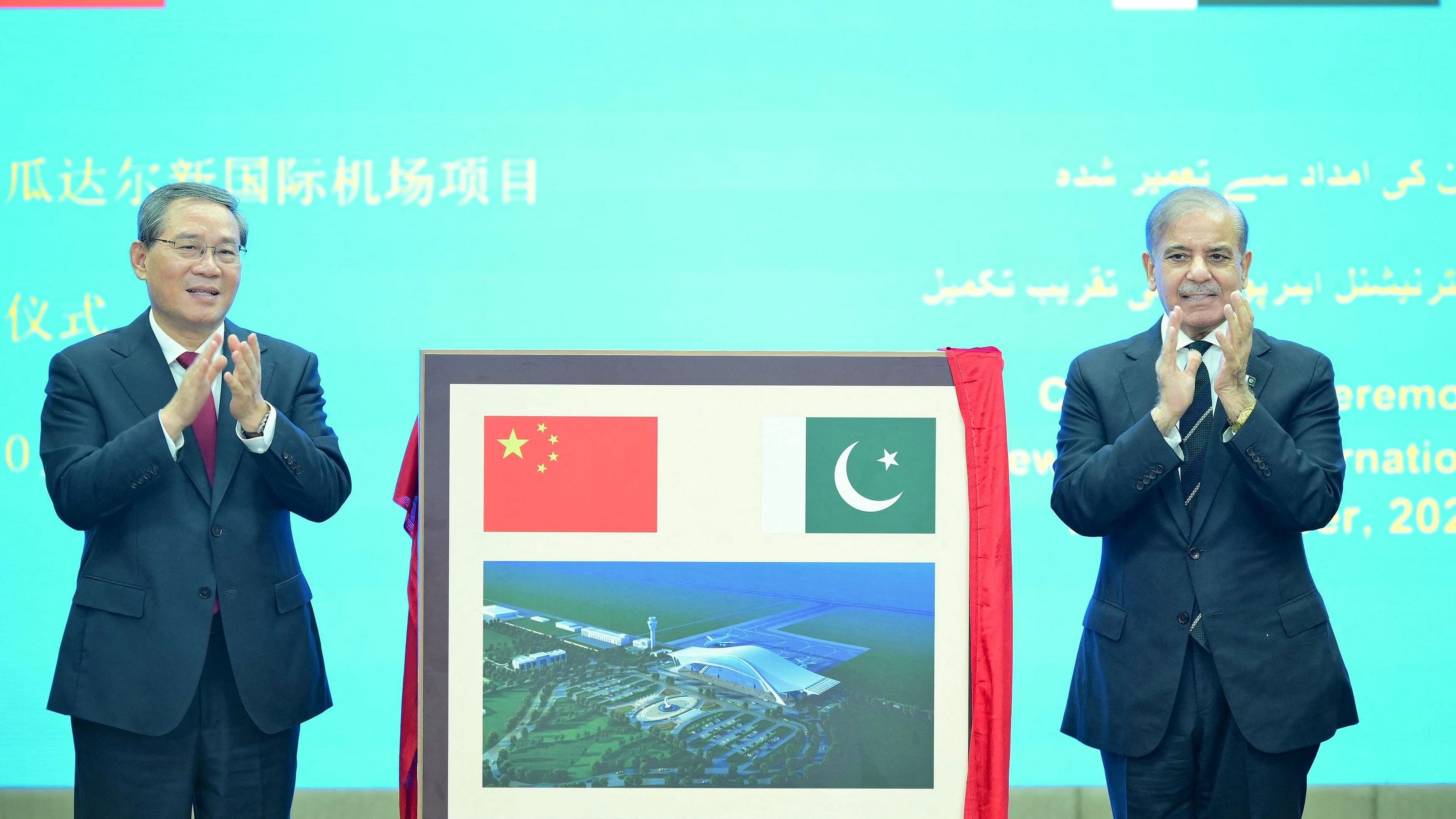
Chinese Premier Li Qiang and Pakistan's Prime Minister Shehbaz Sharif
Credit: Reuters Photo
Islamabad: Pakistan Prime Minister Shehbaz Sharif on Wednesday rooted for Beijing’s Belt and Road Initiative at the SCO summit here, saying such connectivity projects should not be viewed through a "narrow political prism" -- an apparent reference to India's reluctance to endorse it.
In his opening remarks at the Shanghai Cooperation Organisation summit, he said efforts like China's Belt and Road Initiative and the China-Pakistan Economic Corridor, which is a part of the larger project, should be expanded.
India has shown little enthusiasm for the China's "unilateral" initiative. And it has repeatedly criticised the China-Pakistan corridor for violating its territorial integrity as it involves building infrastructure in Pakistan-Occupied Kashmir.
Indirectly challenging India’s position, Sharif said, “Let us not look at such projects through the narrow political prism, and invest in our collective connectivity capacities which are crucial to advancing the shared vision of an economically integrated region.”
In his speech later, External Affairs Minister S Jaishankar said trade and connectivity initiatives must recognise territorial integrity and sovereignty and it is essential to have an "honest conversation" on lack of trust, a remark seen as an indirect reference to China.
The SCO comprises China, India, Russia, Pakistan, Iran, Kazakhstan, Kyrgyzstan, Tajikistan, Uzbekistan and Belarus. Sixteen more countries are affiliated as observers or “dialogue partners”.
In his closing address, the Pakistan leader condemned the Israeli attacks in Gaza.
"We cannot ignore the ongoing genocide in Gaza, the international community bears the responsibility to ensure an immediate and unconditional ceasefire leading to the establishment of state of Palestine on the basis of pre-1967 borders with Al-Quds as its capital,” he said.
The Pakistan prime minister urged member states to strengthen the SCO framework to tackle regional challenges.
“We are at a historic moment of transition where sweeping transformations are reshaping the global, social, political, economic, and security landscape,” he said.
He affirmed Pakistan’s “commitment to regional peace, stability and enhanced connectivity and sustainable socio-economic development”.
He said the SCO embodies the “collective voice and wishes of over 40 per cent of the global population anchored in the Shanghai spirit”.
"Together, we have the potential to drive socio-economic progress, enhance regional peace and stability, and to improve the quality of life for our citizens,” he said.
Sharif urged the leaders to use the SCO meeting to “exchange ideas, share best practices and forge concrete action plans that will benefit our economies and societies”. He expressed hope that “wonderful outcomes that will emerge from our in-depth deliberations”.
“Our collaboration, joint teamwork expands academic and tourism linkages, poverty alleviation, empowerment of women and youth across the SCO region are reflection and commitment of our determination to promote prosperity through unity,” he said.
Sharif said Afghanistan provides opportunities for trade and transit, while also asking the Taliban government in that country to ensure that its territory is not used for terrorism against its neighbours.
He called for collective efforts to eradicate poverty. “Poverty is not just a social issue but a moral imperative,” he said.
He said it is time to tackle the threat of the climate change sweeping across the region.
“Climate change is an existential crisis that transcends our borders and its impacts are felt universally,” the Pakistani leader said.
He said Pakistan was on the frontline of disasters linked with climate change, as shown by 2022 floods that affected millions of people and caused losses worth USD30 billion.
There was no direct reference in his speech to bilateral issues with India.
Pakistan became a full member of the SCO at its 2017 summit in Kazakhstan.